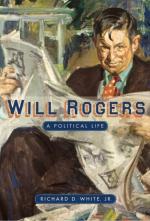|
This section contains 5,013 words (approx. 17 pages at 300 words per page) |

|
SOURCE: "The Crackerbarrel Sage in the West and South: Will Rogers and Irvin S. Cobb," in The American Humorist: Conscience of the Twentieth Century, Iowa State University Press, 1964, pp. 113-33.
In the following essay, Yates explains the ways in which Rogers adapted and modified the tradition of nineteenth-century American humorists.
As a frontispiece to the revised edition (1960) of his book, Native American Humor, Walter Blair has drawn a circle of nineteenth-century humorists seated around a potbellied stove, evidently swapping yarns. If Professor Blair had added one of George Ade's self-made men, and portraits of Abe Martin, Will Rogers, Irvin S. Cobb, and possibly E. W. Howe, O. O. Mclntyre, Walt Mason, and Ellis Parker Butler, he might have emphasized a point made in the text and in his Horse Sense in American Humor, the point, namely, that the nineteenth-century hot-stove tradition in American humor continued unbroken into the...
|
This section contains 5,013 words (approx. 17 pages at 300 words per page) |

|


